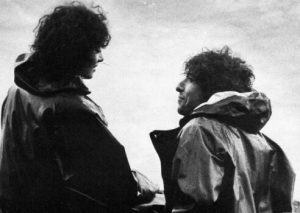by Jochen Markhorst
“But I’m not going to make an album and lean on a marriage relationship. There’s no way I would do that, any more than I would write an album about some lawyers’ battles that I had. There are certain subjects that don’t interest me to exploit. And I wouldn’t really exploit a relationship with somebody. (…) So a person in my position says, “Well, I got this available information, this is the way I really feel; I think I’ll write it and say how I feel.” I don’t do that. I don’t like feeling those kinds of feelings. I’ve got to think I can do better than that. It’s not going to positively help anybody to hear about my sadness. Just another hard luck story.”
(interview with Bill Flanagan, 1985)
 To remain discreet is a thing to Dylan, especially in the days when it is rumbling in his marriage, in the days he writes Blood On The Tracks. Prior to the above words, he has regretted the indiscrete “Ballad In Plain D” and indirectly admitted that “Idiot Wind” crosses that border, too. But despite his noble intention, the poet Dylan can not prevent private turbulence, observations, emotions from seeping into his work – he is human, and no man is an island. He is aware of this. In his radio program Theme Time Radio Hour (episode 71, Birds) he gives attention, in general, to that mechanism.
To remain discreet is a thing to Dylan, especially in the days when it is rumbling in his marriage, in the days he writes Blood On The Tracks. Prior to the above words, he has regretted the indiscrete “Ballad In Plain D” and indirectly admitted that “Idiot Wind” crosses that border, too. But despite his noble intention, the poet Dylan can not prevent private turbulence, observations, emotions from seeping into his work – he is human, and no man is an island. He is aware of this. In his radio program Theme Time Radio Hour (episode 71, Birds) he gives attention, in general, to that mechanism.
A caller from Bloomington, Indiana, has a fundamental question about the song “The Coo Coo Bird” by Clarence Ashley. He wonders what Ashley means by that date, why the singing bird “never hollers coo coo ’til the fourth day of July”. What do I know, says the radio host Dylan:
“If I had to guess, I’d guess it had more do with Clarence Ashley. Perhaps the Fourth of July was important to him for some reason. Maybe it was somebody’s birthday or the day his wife walked out of him. You can never tell why someone’s gonna stick something in a song. You just gotta remember that the whole is bigger than the sum of its parts. You can’t expect to understand everything in every song.”
He may, however, decide not to publish such a trickled in, unwanted indiscretion or to rewrite it. And that seems to have happened with “Call Letter Blues”. More radically than ever; Dylan deletes the entire text, writes the words for “Meet Me In The Morning” and sings over the original basic track of “Call Letter Blues”. It is a unique manoeuvre in Dylan’s output and is probably inspired by his embarrassment about the all too open peep-in, about the verses 2 and 3, which tend to be exploiting:
Well, your friends come by for you I don't know what to say Well, your friends come by for you I don't know what to say I just can't face up to tell 'em Honey, you just went away
Well, children cry for mother I tell them, "Mother took a trip" Well, children cry for mother I tell them, "Mother took a trip" Well, I walk on pins and needles I hope my tongue don't slip
On the other hand: he can not completely reject the song. Dylan publishes the text in The Lyrics (incomplete, oddly enough, only the first four of the seven couplets, just like on the site). And the third, last take of “Call Letter Blues” is selected for the first episode of the acclaimed Bootleg Series (1991).
The release of the recording triggers the discussion about the correctness of Dylan’s intervention in 1974, and arouses the generally rather senseless exchange of opinions about which song is better. So in this case: “Meet Me In The Morning” or “Call Letter Blues”?
On expectingrain.com, the majority of Dylan fans tend to Call Letter on the relevant discussion forum, while many Meet Me voters admit that they prefer “Meet Me In The Morning” for nostalgic reasons; after all, that is the version that they first heard when they were crushed by Blood On The Tracks, back in the day.
It is understandable; the magical power of a 56th and Wabasha alone overshadows the most beautiful couplets of Call Letter. But from a distance, without that statistic-polluting nostalgia, the superior class of “Call Letter Blues” is hard to ignore.
The title is already a first great find. Inspired by “Sad Letter Blues” from Tampa Red, presumably, but a call letter is the employer letter in which you are offered a job or in which you are invited for a job interview. It is a beautiful, original and twentieth-century metaphor for the supplication of a poor devil who wants to have his wife back home and a beautiful flag on the poetic, refined blues song, which despite its multicoloured nature is more coherent than “Meet Me In The Morning”.
In terms of content, it is a variant on the song from which it also borrowed the structure, on “32-20 Blues” by Big Maceo from 1945 (with Tampa Red on guitar) and on the motif of the murderous cuckold at any rate. The poet Dylan, however, incorporates that motif infinitely more elegantly than the many straightforward classics from the decades before. There, it usually is presented with the subtlety of the sledgehammer:
 I walked all night long with my 32-20 in my hand
I walked all night long with my 32-20 in my hand
I walked all night long with my 32-20 in my hand
Lookin’ for my woman, while I found her with another man
… as Big Maceo sings in that “32-20 Blues”. Robert Johnson does not like mistiness either, in the eponymous, much-covered classic, which is also on Dylan’s repertoire:
And if she gets unruly, thinks she don’t wan’ do
If she gets unruly and thinks she don’t wan’ do
Take my 32-20, now, and cut her half in two
Still, neither of these men, Big Maceo nor Robert Johnson, and indirectly Dylan, did invent it. Back in 1929, Robert Sykes recorded the bloodthirsty “44 Blues”, with the opening lines that will end up in “Call Letter Blues” via Big Maceo:
Lord, I walked all night long with my forty-four in my hand
Lord, I walked all night long, my forty-four in my hand
I was lookin’ for my woman, found her with another man
A year later Sykes also writes a “32-20 Blues” (same title, but another song than Maceo’s and Johnson’s) and is also pretty clear:
Lord, I carry my 32-20 in my right hand
Lord, I carry my 32-20 in my right hand
Lord, I’ll shoot my woman ’bout wastin’ time with a monkey man
It always has been and continues to be a popular motif throughout the ages, the bloody revenge of the deceived lover. It appeals to a millennia-old moral sense and is legitimized early in the Old Testament, in Leviticus 20: And the man that committeth adultery with another man’s wife, even he that committeth adultery with his neighbour’s wife, the adulterer and the adulteress shall surely be put to death.
Half of the opera repertoire relies on the crime passionnel, in the judiciary, it is a mitigating circumstance, it is an evergreen in Hollywood and in the pop music from The Beatles (“Run For Your Life”, 1965) to Rihanna (“Man Down”, 2011). But never as fragile, as suggestive as in “Call Letter Blues”.
The prelude is pastoral. A lonely soul walks the streets at night and seeks solace in the distant sounds of church bells. Intriguing is the cliff hanger: he wonders whether those bells are ringing for him, for something he would have done wrong.
The solitude, we understand in the second verse, is involuntary. His wife has left him. Not only him, tells verse three, the children miss their mother too and he does not know what to say, he is lying about a holiday trip, he bites his tongue: I walk on pins and needles and I hope my tongue don’t slip. It occupies him in a sheer neurotic way. Every time someone walks past their house, he jumps up. Is it she? Is she back? Only then, in the fifth verse, we learn that there is another man in play. But this wretch is the meek opposite of all those gun-wielding, violent blues heroes. I know you’re with another man, but that’s alright. You know I always understand. A comforting escape to carnal, physical love is within reach, he walks along the harlots, they are all free … but the grief is too overwhelming, his head is not there.
So far it already is an original, layered variation on all that murderous My Baby Left Me whining from the blues canon. This narrator is not aggressive, aggrieved, unreasonable. He does not want revenge, he is gentle and forgiving, and wants to save his children grief.
But then the last verse.
My ears are ringin' Ringin' like empty shells My ears are ringin' Ringin' like empty shells Well, it can't be no guitar player It must be convent bells
Ringing ears, “like empty [bullet] shells”, and that is due to the death bells of the monastery; we now get the answer to that riddle in the first verse, where the church bells are ringing, “maybe because I’ve done something wrong”.
The mild, lenient narrator is either a confused, or an intelligent psychopath, at least a man who knows how to conceal, fully credible, that he has just shot down his adulterous wife – perhaps because he does not even remember it.
It is a pioneering, literary version of all those revenge songs that “Call Letter Blues” elaborates on. In those songs the firearm violence is usually announced in the first or second verse. The narrator swings his 32-20 (the .32-20 refers to the 32 calibre Winchester bullet with a load of 20 grains, about one and a half grams, gunpowder), his German Luger (“Down In Spirit Blues”, Tampa Red), his razor, rifle and Gatling machine gun (“Georgia Hound Blues”, also from Tampa Red) or his .44 (Roosevelt Sykes means his .44 Winchester, “the gun that won the West”).
Similarly, Dylan’s forerunners are painfully clear about what they are planning to achieve with those tools (“shoot my lady”, “kill my baby”, “she’s dead and gone”), but this protagonist surprises us with his murderous mood, and then still only indirectly; through that unusual, lugubrious empty bullet shell metaphor and that reference to the church bells, he only hints, in the very last verse only, that there is blood on his tracks.
The church bells metaphor is just as classic, and in this song just as suggestive and indirect as the firearm violence. On his debut album Dylan covers already the evergreen “See That My Grave Is Kept Clean”:
Did you ever hear them church bells tone
Means another poor boy is dead and gone
… like death bells sound in dozens of blues songs, and they always mean that these bells are ringing because my baby is dead. The Mississippi Sheiks in “Stop And Listen Blues” (1929), Muddy Waters in his “Buryin’ Ground Blues” (1947), “Sad And Lonely Day” by Roosevelt Sykes (1933) and Dylan himself, too, sometimes chooses the explanatory addition. In “Standing On The Doorway” for example, and in “Can’t Escape From You”: 
The dead bells are ringing
My train is overdue
To your memory I’m clinging
I can’t escape from you
But in “Call Letter Blues” words like dead, or gone, or no more do not occur; just like the empty bullet shells, these clocks only insinuate a macabre background.
The poet Dylan produces here, in short, a veiled literary thriller superior to “Romance In Durango” (Desire, 1976) to “Señor” (Street Legal, 1978), to “Man In The Long Black Coat” (Oh Mercy, 1989), reaching a level he will not achieve again until “Soon After Midnight” (Tempest, 2012): so very, very much more than just another hard-luck story.
Jochen is a regular reviewer of Dylan’s work on Untold. His books are available via Amazon both in paperback and on Kindle:
- Blood on the Tracks: Dylan’s Masterpiece in Blue
- Blonde On Blonde: Bob Dylan’s mercurial masterpiece
- Where Are You Tonight? Bob Dylan’s hushed-up classic from 1978
- Desolation Row: Bob Dylan’s poetic letter from 1965

We are actively promoting a link to this interesting topic on The Bob Dylan Project at:
https://thebobdylanproject.com/Song/id/4/32-20-Blues
https://thebobdylanproject.com/Song/id/103/Call-Letter-Blues
If you are interested, we are a portal to all the great information related to this topic.
Join us inside Bob Dylan Music Box.